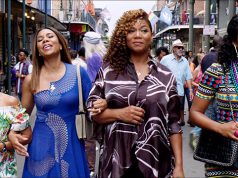“Uptown Girls” is a bewildering film. It would appear to be a syrupy, female version of “About a Boy,” in which an irresponsible, terminally unemployed grownup is taught important life lessons through a friendship with a precocious youngster. But it turns out to be more somber than that, the sort of film that shuffles along sleepily, dazedly, barely aware of what it’s doing and hardly caring whether the audience is still following it or not. I was wide awake for the entire movie, but I emerged from it feeling disoriented and logy, like I’d just had a nap.
Brittany Murphy plays Molly Gunn, daughter of the legendary fictional rock star Tommy Gunn, who died years ago, leaving Molly set for life in a swanky Manhattan suite. Now, however, on the eve of her 22nd birthday, Dad’s accountant has fled the country with all of Molly’s money, leaving her penniless and jobless. She has not worked a day in her life and seems unfamiliar with the concept, but her devoted friends do their best to get her on her feet.
She winds up working as a nanny for 8-year-old Ray Schleine (Dakota Fanning), an obsessive-compulsive miniature grownup whose mother (Heather Locklear) is a music executive with no time for motherhood. Ray disapproves of Molly’s immaturity; Molly is mortified at how Ray has removed all the fun from childhood. Surely they will together learn much about the ways of the world.
For the most part, it’s useless, watered-down comedy on the level of Molly opening an over-stuffed closet and winding up under an avalanche of junk. (For some reason, every time this gag appears on film, it is a pile of shoeboxes. Who keeps that many shoeboxes stacked in a closet?) Later, we are treated to the shopworn classic of borrowing a handkerchief to blow one’s nose, doing so loudly and wetly, attempting to return the hankie to its owner, and being told, “No, you keep it.” I was astonished that this bit actually garnered a laugh from a gentleman seated near me. Is it possible this man had never before seen a motion picture or television show and thus was not familiar with the gag? The mind reels.
At any rate, the comedy is weak, but harmless. It is the film’s plot devices, sudden reversals of tone and illogical leaps that brand it the work of amateurs (three writers are credited).
For example, Molly meets up-and-coming musician Neil (Jesse Spencer) and throws herself at him embarrassingly, presumably for laughs, though it is hard to appreciate the humor when the person is behaving so out-of-character. Neil has taken a Morrissey-esque vow of celibacy, which Molly quickly breaks him of. Next thing you know, Neil is telling Molly they can’t see each other anymore, and the trouble with this is, they never WERE seeing each other. Evidently, the screenwriters were familiar with “we can’t see each other anymore” scenes from good movies they’d watched, and they wanted to include one in their movie, even if it didn’t fit.
Later, Molly is strangely discourteous to her friends, for no discernible reason other than that it allows for a reconciliation scene later — again, perhaps one of the things the writers were fond of and wished to include, regardless of its belonging or not belonging.
I also wish to mention Neil’s character. He shuns Molly because she smothers him, but then uses her as a muse to write the worst pop song ever written (it’s called “Sheets of Egyptian Cotton”), but then continues to shun her, even though she proved useful.
There is also a weird “Secret Garden” feel to the whole thing, what with Ray’s comatose father living in the library and Ray being sad all the time.
Molly and Ray’s relationship is one of the film’s better aspects, but only because it is not egregiously unbelievable, thus putting it a step above all the other relationships in the movie. Brittany Murphy is a likable actress, but she must be given characters who behave more consistently and who have a purpose. Dakota Fanning, on the other hand, needs to go away until she is 18, at which point she may return and slowly work her way into films again. But she is currently too cute and precious to be tolerated by civilized human beings.
And so the film works its way up to its non-climax, when all the loose ends get wrapped up and absolutely nothing unusual or surprising happens. The end is much like the end of a dream. It’s not that the plot drove it to a finale; it’s that it simply and arbitrarily chose to end.
D+ (1 hr., 35 min.; )





